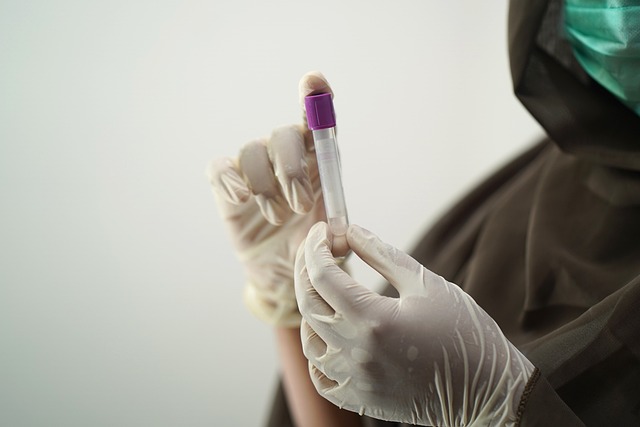In the UK, maintaining optimal cholesterol levels is a key aspect of cardiovascular health and overall well-being. The National Health Service (NHS) provides the General Health Blood Test UK, which includes measuring total cholesterol, LDL ('bad cholesterol'), HDL ('good cholesterol'), and triglycerides to assess cardiovascular risk. High LDL cholesterol can lead to arterial plaque and increase the likelihood of heart attacks and strokes, while HDL cholesterol plays a beneficial role in cardiovascular health by clearing cholesterol from the bloodstream. The NHS advises regular blood tests, along with lifestyle adjustments such as a diet low in saturated fats and cholesterol, routine physical activity, and abstaining from tobacco use to manage cholesterol levels effectively. If needed, medication may also be prescribed. Regular follow-up with the General Health Blood Test UK is essential for monitoring progress and ensuring that health strategies are up-to-date and effective in line with NHS guidelines. This comprehensive approach ensures early detection and management of dyslipidaemia, contributing to the prevention of cardiovascular diseases within the UK population.
Identifying cholesterol levels through blood tests is a pivotal health monitoring tool. This article elucidates the significance of such tests in the UK context, offering insights into understanding cholesterol’s influence on overall well-being and how to interpret test results for effective cholesterol management. A General Health Blood Test serves as an invaluable diagnostic measure for early detection and prevention strategies, ensuring individuals maintain optimal cardiovascular health.
- Understanding Cholesterol and Its Impact on General Health: A Comprehensive Guide
- The Role of Blood Tests in Monitoring Cholesterol Levels in the UK
- How to Interpret Your General Health Blood Test Results and Manage Cholesterol
Understanding Cholesterol and Its Impact on General Health: A Comprehensive Guide

Cholesterol, a waxy, fat-like substance found within the bloodstream, is pivotal in several bodily functions, including the production of hormones, digesting fats, and building cell membranes. However, its presence must be carefully managed to maintain general health. High levels of low-density lipoprotein (LDL), often termed ‘bad cholesterol’, can lead to plaque buildup in arteries, which significantly increases the risk of heart attacks and strokes. Conversely, high-density lipoprotein (HDL), known as ‘good cholesterol’, helps remove excess cholesterol from the bloodstream, thereby promoting cardiovascular health.
In the UK, understanding one’s cholesterol levels is a cornerstone of preventive healthcare. A simple blood test, readily available through the NHS (National Health Service) or private healthcare providers, can measure the amounts of cholesterol in your blood. This test provides critical data for assessing an individual’s cardiovascular risk and informing lifestyle choices that can improve general health outcomes. Regular monitoring of cholesterol levels is a proactive approach to managing heart health, and it is advisable for individuals to discuss with their healthcare provider the frequency of such tests based on personal health factors. A comprehensive guide to understanding cholesterol involves not only recognizing its role in the body but also taking actionable steps to manage intake of saturated fats and cholesterol through diet, engaging in regular physical activity, and avoiding tobacco use. These measures collectively contribute to a healthier lifestyle that can prevent or mitigate cardiovascular diseases, thereby safeguarding overall well-being.
The Role of Blood Tests in Monitoring Cholesterol Levels in the UK

In the United Kingdom, blood tests play a pivotal role in the surveillance and management of cholesterol levels, which is a cornerstone of general health monitoring. These tests, readily available across NHS facilities and private clinics, provide a snapshot of an individual’s lipid profile, including total cholesterol, low-density lipoprotein (LDL) cholesterol, high-density lipoprotein (HDL) cholesterol, and triglycerides. The data obtained from these tests are instrumental in diagnosing dyslipidaemia, a condition characterised by abnormal blood fats that can significantly increase the risk of cardiovascular diseases, including heart attacks and strokes. In the UK, the National Health Service (NHS) offers comprehensive guidelines for cholesterol management, which include regular monitoring through blood tests. This proactive approach ensures that individuals with high cholesterol levels can receive appropriate interventions, such as lifestyle modifications or medication, to mitigate their health risks. The General Health Blood Test UK is a key service that encompasses the assessment of cholesterol and other vital health markers, contributing to the nation’s efforts to prevent and manage chronic conditions effectively. Regular screening and early intervention facilitated by these tests are crucial for maintaining cardiovascular health and overall well-being within the populace.
How to Interpret Your General Health Blood Test Results and Manage Cholesterol

Regular monitoring of cholesterol levels is a key component in maintaining overall cardiovascular health. In the UK, a General Health Blood Test UK serves as an effective tool for this purpose. When interpreting your results from such a test, it’s crucial to understand the composition of your cholesterol profile, which includes total cholesterol, LDL (low-density lipoprotein or “bad” cholesterol), HDL (high-density lipoprotein or “good” cholesterol), and triglycerides. The National Health Service (NHS) in the UK provides guidelines on what these levels should be to reduce the risk of heart disease and stroke.
If your General Health Blood Test UK indicates high LDL cholesterol, it’s important to take steps to lower it. This can often be achieved through lifestyle changes such as a balanced diet low in saturated fats, regular exercise, and avoiding tobacco use. In some cases, medication may also be prescribed by a healthcare professional to manage cholesterol levels effectively. For those with high HDL cholesterol, the goal is to maintain these levels, as higher HDL can help remove LDL cholesterol from your arteries. Additionally, managing other risk factors like hypertension and diabetes is essential for comprehensive heart health management. It’s advisable to consult with a healthcare provider to interpret your results accurately and to develop a personalized plan to manage your cholesterol levels within the healthy range, as recommended by the NHS guidelines. Regular follow-up tests are also important to track any changes over time and adjust your management strategy as needed.
regular monitoring of cholesterol levels through blood tests is a crucial step in maintaining one’s general health, especially within the context of the UK’s healthcare system. By understanding what your General Health Blood Test results indicate about your cholesterol status, individuals can take proactive measures to manage their lipid profiles effectively. The insight provided by these tests enables informed decisions regarding diet, exercise, and potential medication use, ultimately contributing to a healthier life. In conclusion, staying informed about your cholesterol levels through blood testing is an integral part of a comprehensive approach to healthcare in the UK, offering peace of mind and the opportunity to make lifestyle adjustments that can significantly impact overall well-being.
